Leadership and Management for Service Industries: An Analysis
VerifiedAdded on 2023/02/02
|8
|1001
|37
Report
AI Summary
This report examines leadership and management within the service industries, focusing on the essential hard and soft skills required for success, particularly in the context of hotel management. It assesses the importance of sales, marketing, human resource management, team leadership, and coaching. Furthermore, the report critically evaluates the impact of digital technology on management and leadership, highlighting crucial skills for leaders in this evolving sector. It then compares change management systems and leadership approaches across different service industry organizations, using TUI as a key example, and analyzes how change management affects leadership styles, especially regarding employee resistance and communication. The report underscores the significance of change management for organizational growth and the importance of leaders in navigating these changes effectively. References from academic journals and books are also included.
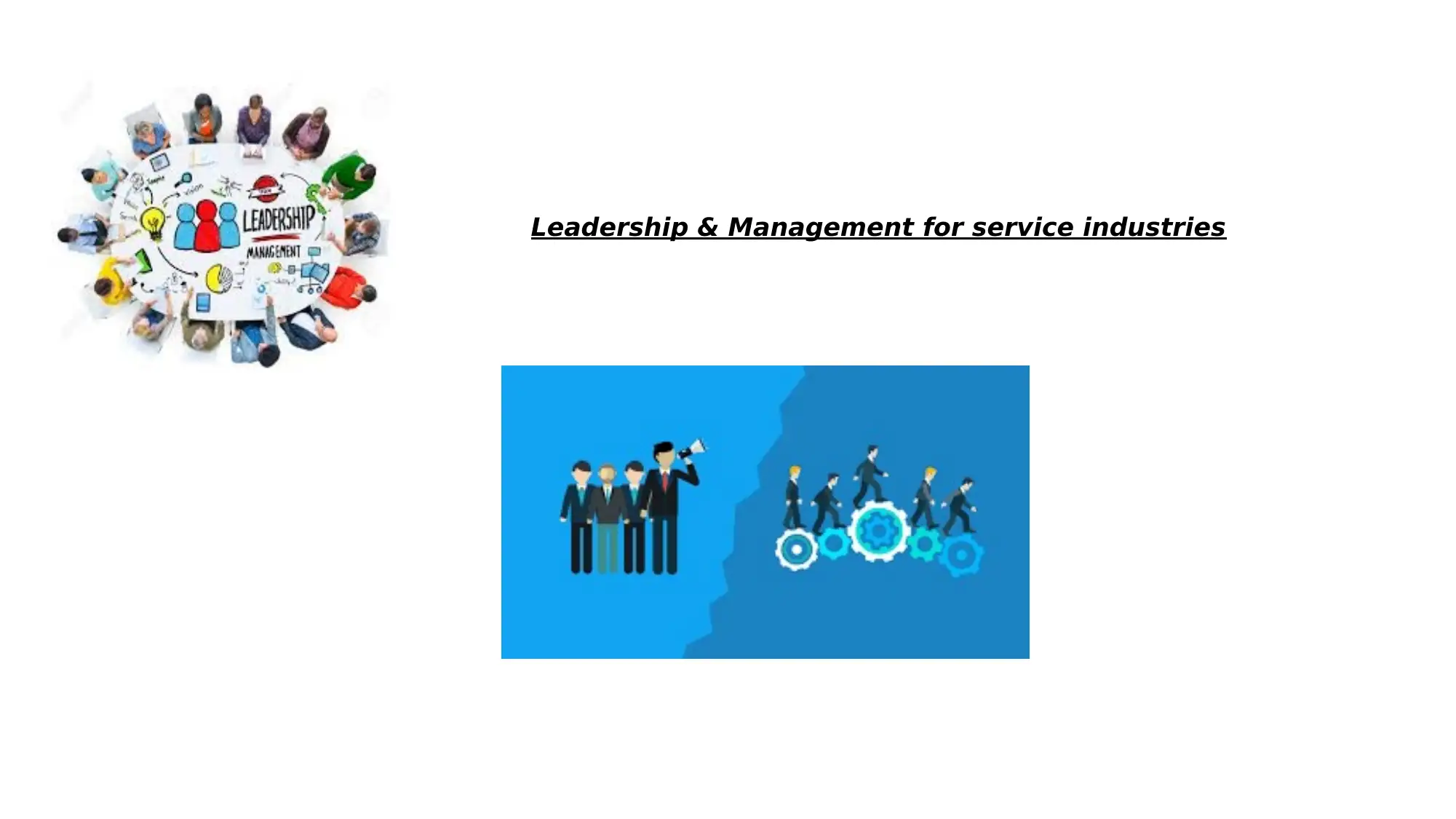
Leadership & Management for service industries
Paraphrase This Document
Need a fresh take? Get an instant paraphrase of this document with our AI Paraphraser
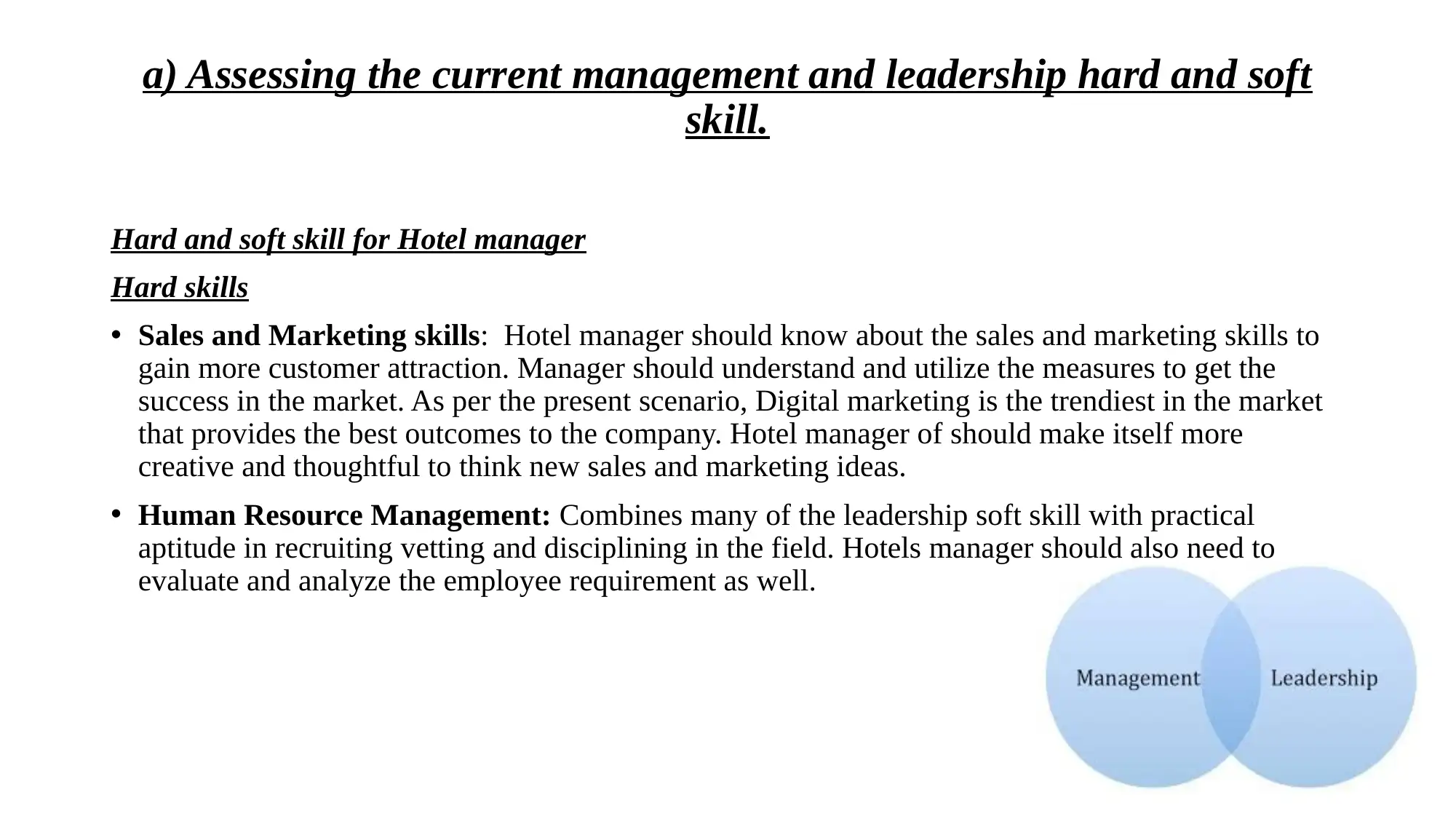
a) Assessing the current management and leadership hard and soft
skill.
Hard and soft skill for Hotel manager
Hard skills
• Sales and Marketing skills: Hotel manager should know about the sales and marketing skills to
gain more customer attraction. Manager should understand and utilize the measures to get the
success in the market. As per the present scenario, Digital marketing is the trendiest in the market
that provides the best outcomes to the company. Hotel manager of should make itself more
creative and thoughtful to think new sales and marketing ideas.
• Human Resource Management: Combines many of the leadership soft skill with practical
aptitude in recruiting vetting and disciplining in the field. Hotels manager should also need to
evaluate and analyze the employee requirement as well.
skill.
Hard and soft skill for Hotel manager
Hard skills
• Sales and Marketing skills: Hotel manager should know about the sales and marketing skills to
gain more customer attraction. Manager should understand and utilize the measures to get the
success in the market. As per the present scenario, Digital marketing is the trendiest in the market
that provides the best outcomes to the company. Hotel manager of should make itself more
creative and thoughtful to think new sales and marketing ideas.
• Human Resource Management: Combines many of the leadership soft skill with practical
aptitude in recruiting vetting and disciplining in the field. Hotels manager should also need to
evaluate and analyze the employee requirement as well.
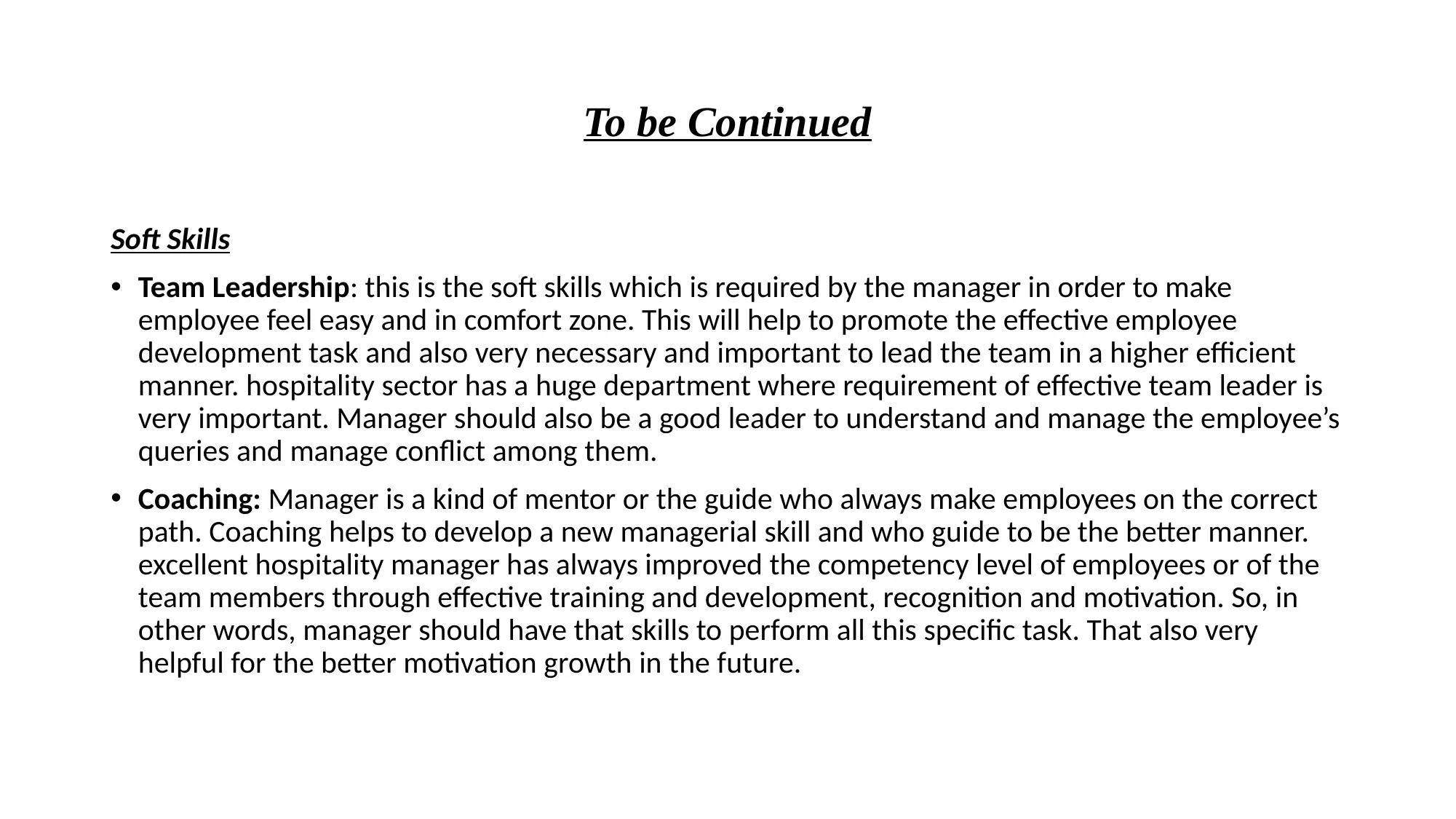
To be Continued
Soft Skills
• Team Leadership: this is the soft skills which is required by the manager in order to make
employee feel easy and in comfort zone. This will help to promote the effective employee
development task and also very necessary and important to lead the team in a higher efficient
manner. hospitality sector has a huge department where requirement of effective team leader is
very important. Manager should also be a good leader to understand and manage the employee’s
queries and manage conflict among them.
• Coaching: Manager is a kind of mentor or the guide who always make employees on the correct
path. Coaching helps to develop a new managerial skill and who guide to be the better manner.
excellent hospitality manager has always improved the competency level of employees or of the
team members through effective training and development, recognition and motivation. So, in
other words, manager should have that skills to perform all this specific task. That also very
helpful for the better motivation growth in the future.
Soft Skills
• Team Leadership: this is the soft skills which is required by the manager in order to make
employee feel easy and in comfort zone. This will help to promote the effective employee
development task and also very necessary and important to lead the team in a higher efficient
manner. hospitality sector has a huge department where requirement of effective team leader is
very important. Manager should also be a good leader to understand and manage the employee’s
queries and manage conflict among them.
• Coaching: Manager is a kind of mentor or the guide who always make employees on the correct
path. Coaching helps to develop a new managerial skill and who guide to be the better manner.
excellent hospitality manager has always improved the competency level of employees or of the
team members through effective training and development, recognition and motivation. So, in
other words, manager should have that skills to perform all this specific task. That also very
helpful for the better motivation growth in the future.
⊘ This is a preview!⊘
Do you want full access?
Subscribe today to unlock all pages.

Trusted by 1+ million students worldwide
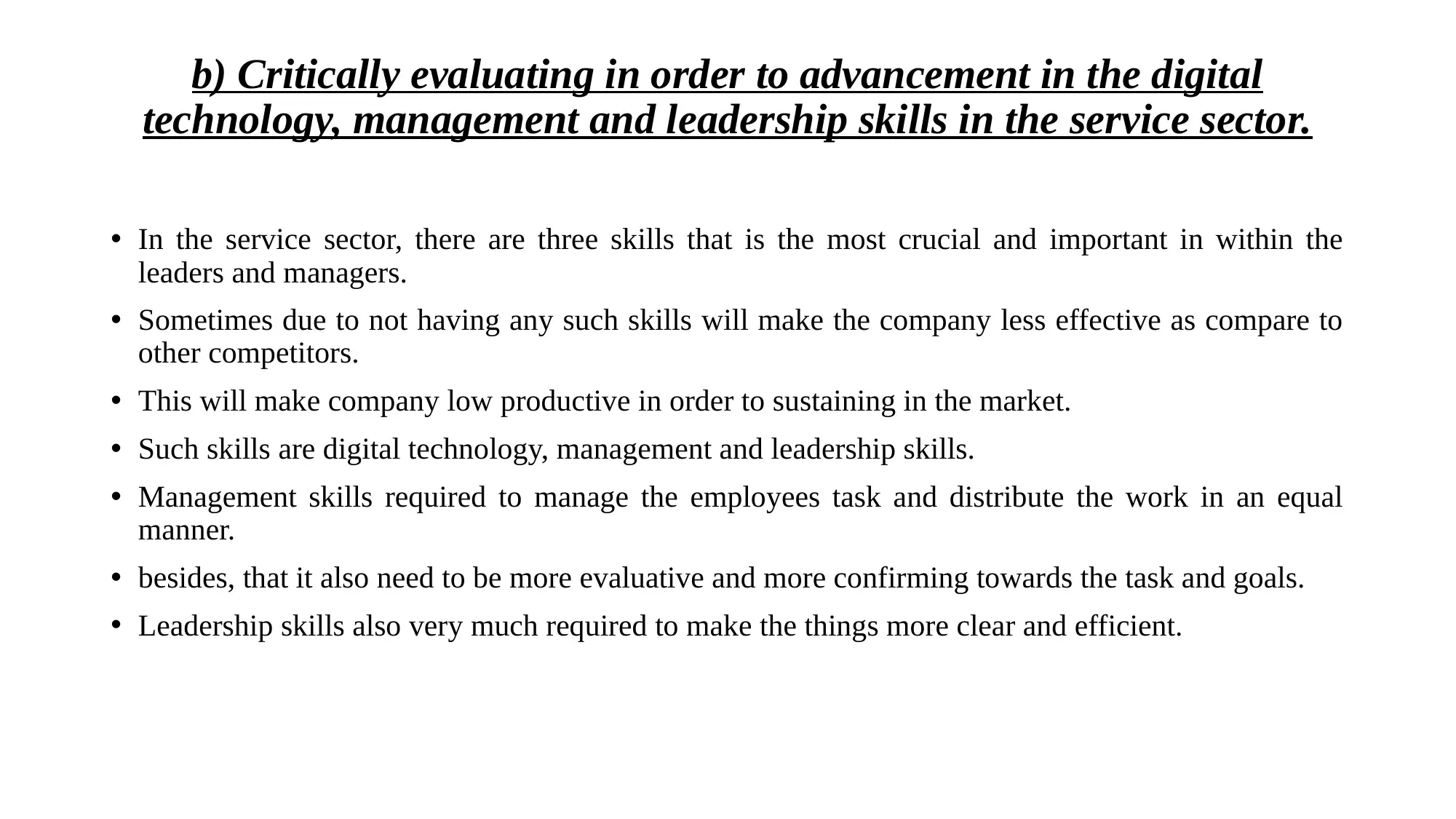
b) Critically evaluating in order to advancement in the digital
technology, management and leadership skills in the service sector.
• In the service sector, there are three skills that is the most crucial and important in within the
leaders and managers.
• Sometimes due to not having any such skills will make the company less effective as compare to
other competitors.
• This will make company low productive in order to sustaining in the market.
• Such skills are digital technology, management and leadership skills.
• Management skills required to manage the employees task and distribute the work in an equal
manner.
• besides, that it also need to be more evaluative and more confirming towards the task and goals.
• Leadership skills also very much required to make the things more clear and efficient.
technology, management and leadership skills in the service sector.
• In the service sector, there are three skills that is the most crucial and important in within the
leaders and managers.
• Sometimes due to not having any such skills will make the company less effective as compare to
other competitors.
• This will make company low productive in order to sustaining in the market.
• Such skills are digital technology, management and leadership skills.
• Management skills required to manage the employees task and distribute the work in an equal
manner.
• besides, that it also need to be more evaluative and more confirming towards the task and goals.
• Leadership skills also very much required to make the things more clear and efficient.
Paraphrase This Document
Need a fresh take? Get an instant paraphrase of this document with our AI Paraphraser
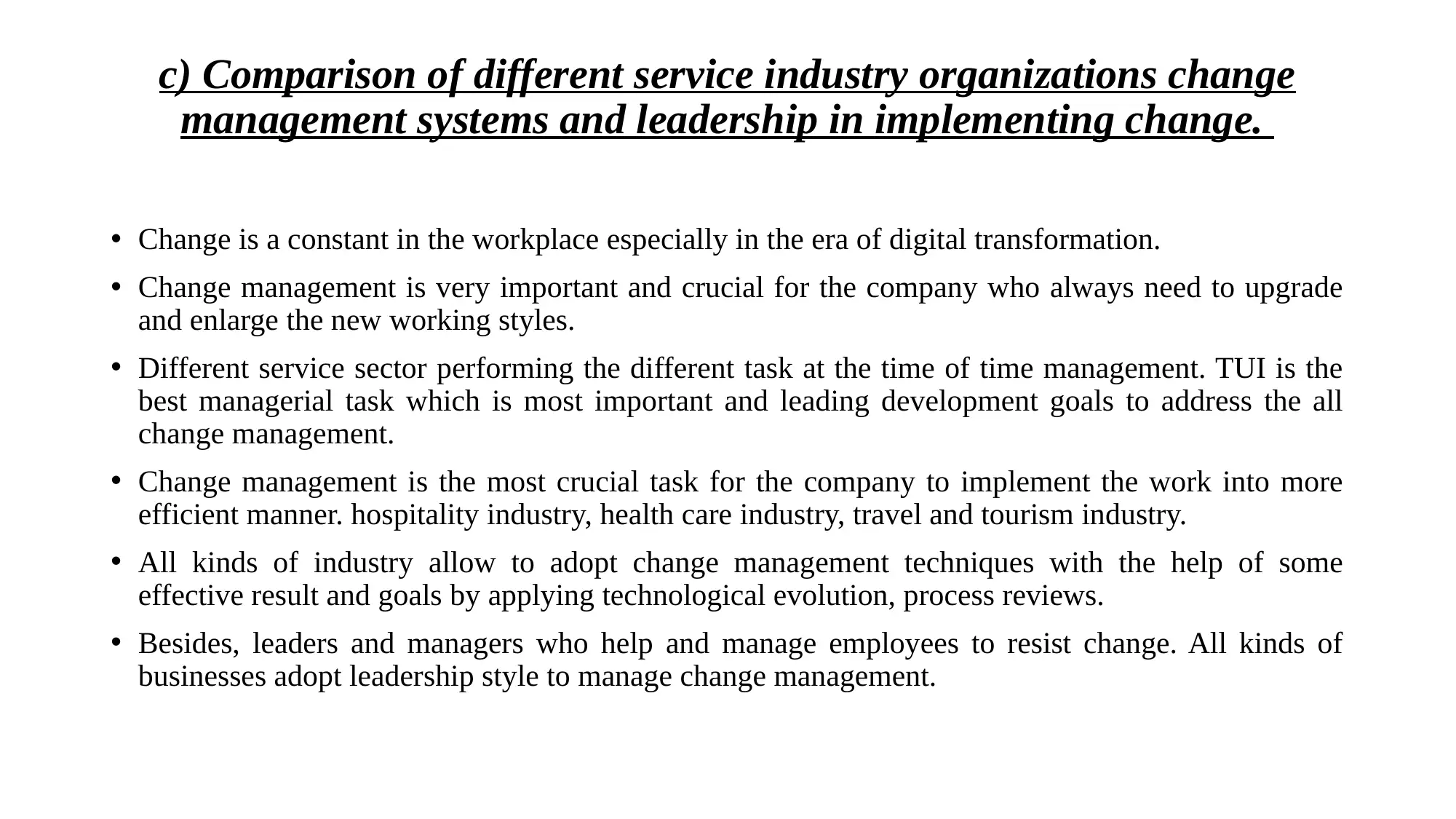
c) Comparison of different service industry organizations change
management systems and leadership in implementing change.
• Change is a constant in the workplace especially in the era of digital transformation.
• Change management is very important and crucial for the company who always need to upgrade
and enlarge the new working styles.
• Different service sector performing the different task at the time of time management. TUI is the
best managerial task which is most important and leading development goals to address the all
change management.
• Change management is the most crucial task for the company to implement the work into more
efficient manner. hospitality industry, health care industry, travel and tourism industry.
• All kinds of industry allow to adopt change management techniques with the help of some
effective result and goals by applying technological evolution, process reviews.
• Besides, leaders and managers who help and manage employees to resist change. All kinds of
businesses adopt leadership style to manage change management.
management systems and leadership in implementing change.
• Change is a constant in the workplace especially in the era of digital transformation.
• Change management is very important and crucial for the company who always need to upgrade
and enlarge the new working styles.
• Different service sector performing the different task at the time of time management. TUI is the
best managerial task which is most important and leading development goals to address the all
change management.
• Change management is the most crucial task for the company to implement the work into more
efficient manner. hospitality industry, health care industry, travel and tourism industry.
• All kinds of industry allow to adopt change management techniques with the help of some
effective result and goals by applying technological evolution, process reviews.
• Besides, leaders and managers who help and manage employees to resist change. All kinds of
businesses adopt leadership style to manage change management.
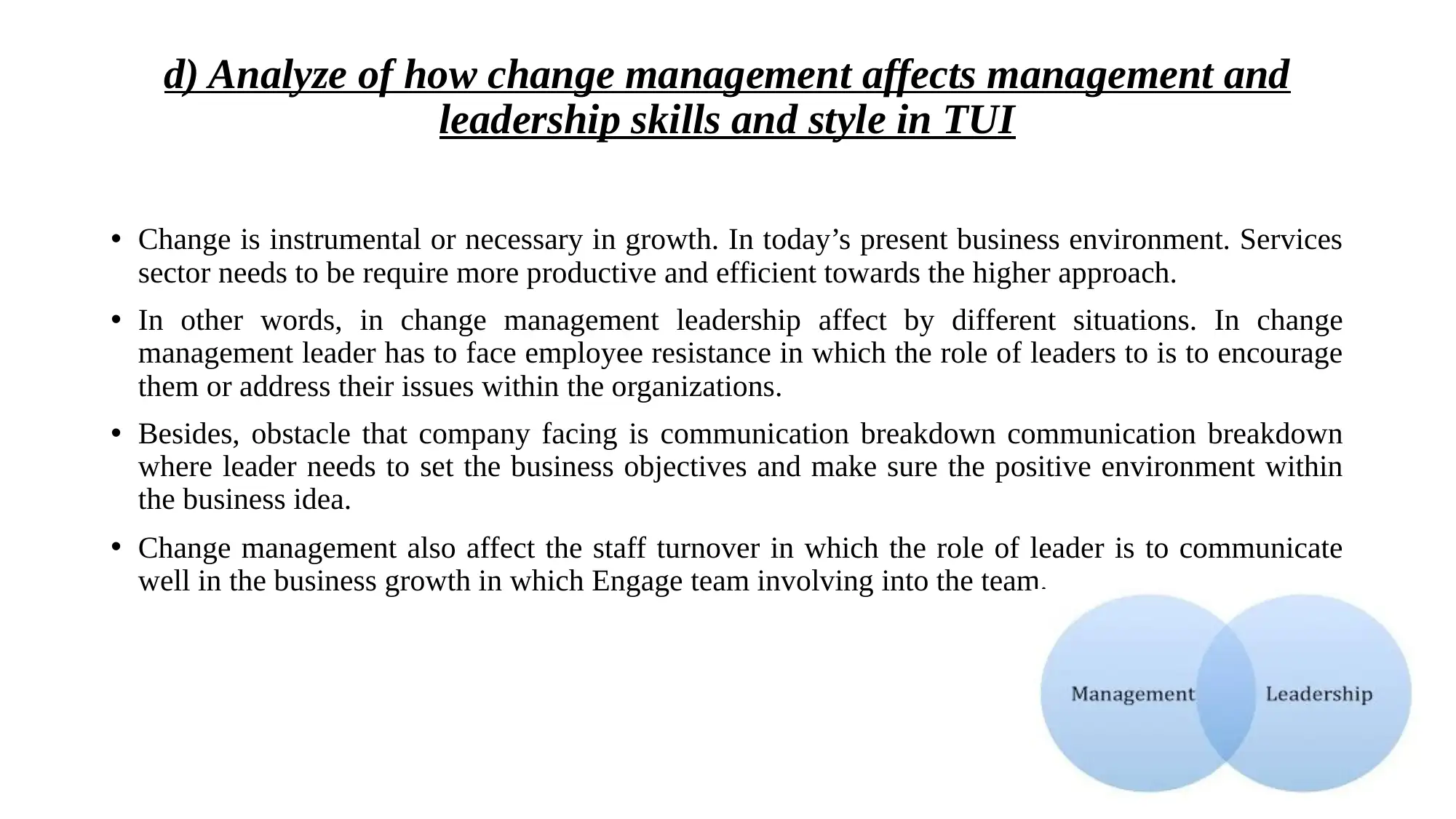
d) Analyze of how change management affects management and
leadership skills and style in TUI
• Change is instrumental or necessary in growth. In today’s present business environment. Services
sector needs to be require more productive and efficient towards the higher approach.
• In other words, in change management leadership affect by different situations. In change
management leader has to face employee resistance in which the role of leaders to is to encourage
them or address their issues within the organizations.
• Besides, obstacle that company facing is communication breakdown communication breakdown
where leader needs to set the business objectives and make sure the positive environment within
the business idea.
• Change management also affect the staff turnover in which the role of leader is to communicate
well in the business growth in which Engage team involving into the team.
leadership skills and style in TUI
• Change is instrumental or necessary in growth. In today’s present business environment. Services
sector needs to be require more productive and efficient towards the higher approach.
• In other words, in change management leadership affect by different situations. In change
management leader has to face employee resistance in which the role of leaders to is to encourage
them or address their issues within the organizations.
• Besides, obstacle that company facing is communication breakdown communication breakdown
where leader needs to set the business objectives and make sure the positive environment within
the business idea.
• Change management also affect the staff turnover in which the role of leader is to communicate
well in the business growth in which Engage team involving into the team.
⊘ This is a preview!⊘
Do you want full access?
Subscribe today to unlock all pages.

Trusted by 1+ million students worldwide
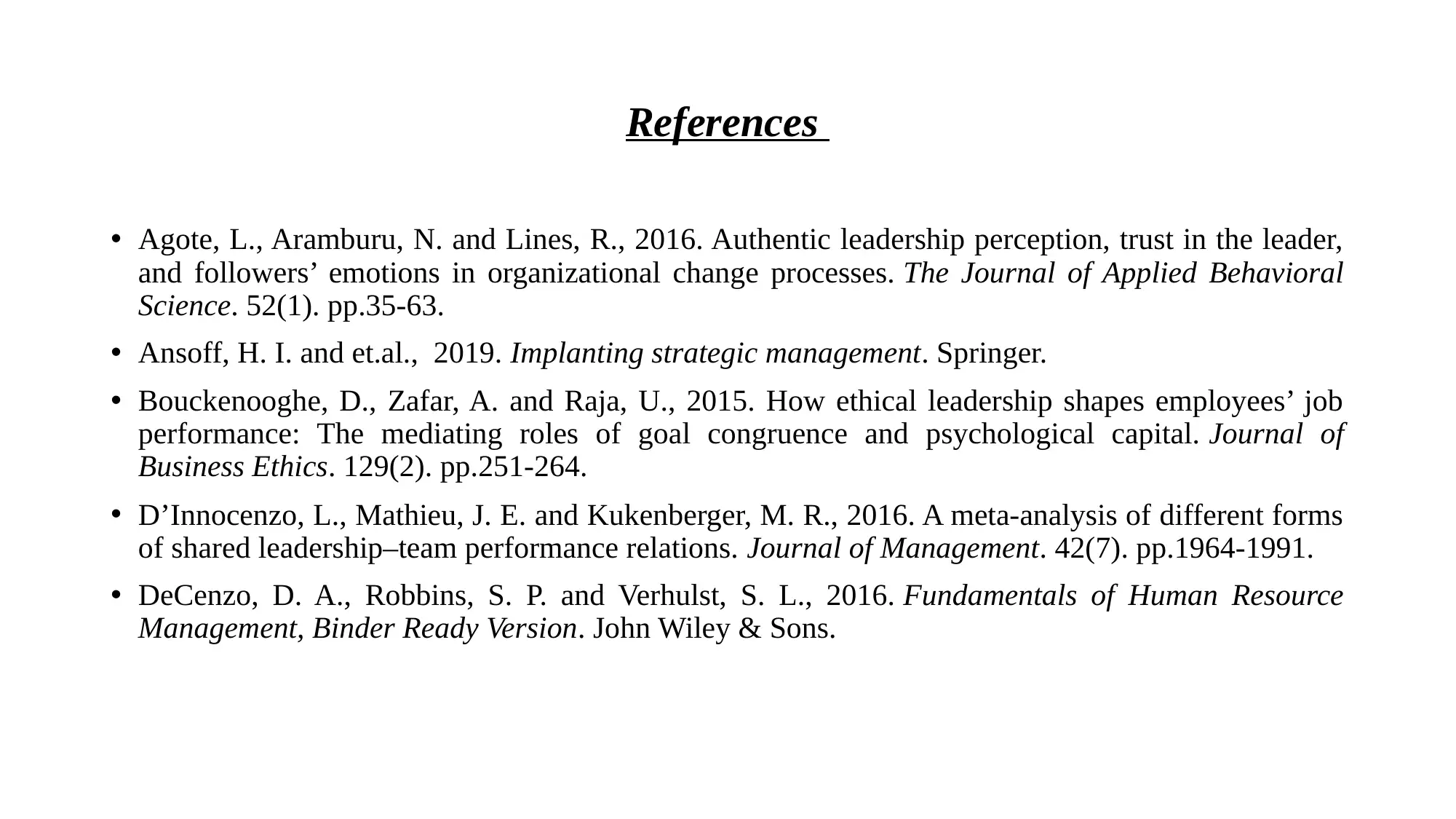
References
• Agote, L., Aramburu, N. and Lines, R., 2016. Authentic leadership perception, trust in the leader,
and followers’ emotions in organizational change processes. The Journal of Applied Behavioral
Science. 52(1). pp.35-63.
• Ansoff, H. I. and et.al., 2019. Implanting strategic management. Springer.
• Bouckenooghe, D., Zafar, A. and Raja, U., 2015. How ethical leadership shapes employees’ job
performance: The mediating roles of goal congruence and psychological capital. Journal of
Business Ethics. 129(2). pp.251-264.
• D’Innocenzo, L., Mathieu, J. E. and Kukenberger, M. R., 2016. A meta-analysis of different forms
of shared leadership–team performance relations. Journal of Management. 42(7). pp.1964-1991.
• DeCenzo, D. A., Robbins, S. P. and Verhulst, S. L., 2016. Fundamentals of Human Resource
Management, Binder Ready Version. John Wiley & Sons.
• Agote, L., Aramburu, N. and Lines, R., 2016. Authentic leadership perception, trust in the leader,
and followers’ emotions in organizational change processes. The Journal of Applied Behavioral
Science. 52(1). pp.35-63.
• Ansoff, H. I. and et.al., 2019. Implanting strategic management. Springer.
• Bouckenooghe, D., Zafar, A. and Raja, U., 2015. How ethical leadership shapes employees’ job
performance: The mediating roles of goal congruence and psychological capital. Journal of
Business Ethics. 129(2). pp.251-264.
• D’Innocenzo, L., Mathieu, J. E. and Kukenberger, M. R., 2016. A meta-analysis of different forms
of shared leadership–team performance relations. Journal of Management. 42(7). pp.1964-1991.
• DeCenzo, D. A., Robbins, S. P. and Verhulst, S. L., 2016. Fundamentals of Human Resource
Management, Binder Ready Version. John Wiley & Sons.
Paraphrase This Document
Need a fresh take? Get an instant paraphrase of this document with our AI Paraphraser
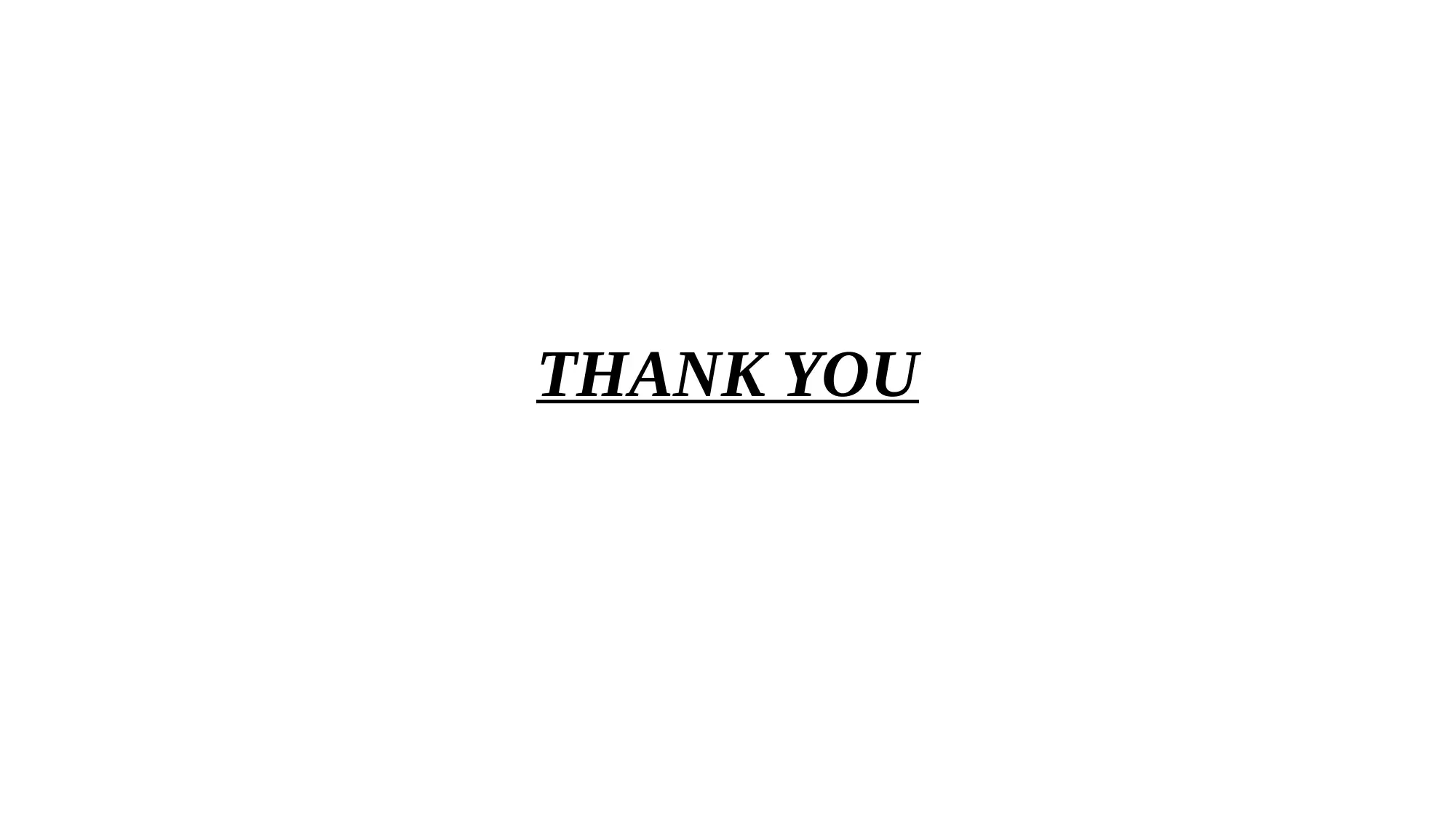
THANK YOU
1 out of 8
Related Documents
Your All-in-One AI-Powered Toolkit for Academic Success.
+13062052269
info@desklib.com
Available 24*7 on WhatsApp / Email
![[object Object]](/_next/static/media/star-bottom.7253800d.svg)
Unlock your academic potential
Copyright © 2020–2026 A2Z Services. All Rights Reserved. Developed and managed by ZUCOL.





